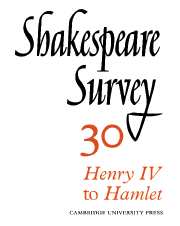Book contents
- Frontmatter
- ‘Henry IV’ and ‘Hamlet’
- Prince Hal and Tragic Style
- The True Prince and the False Thief: Prince Hal and the Shift of Identity
- Falstaff, the Prince, and the Pattern of ‘2 Henry IV’
- Whatever Happened to Prince Hal?: An Essay on ‘Henry V’
- ‘Henry V’ and the Bees’ Commonwealth
- ‘All’s Well that Ends Well’
- ‘Hamlet’ and the Power of Words
- Hamlet the Bonesetter
- ‘Hamlet’: A Time to Die
- Shakespeare, Lyly and Ovid: The Influence of ‘Gallathea’ on ‘A Midsummer Night’s Dream’
- Making a Scene: Language and Gesture in ‘Coriolanus’
- Freedom and Loss in ‘The Tempest’
- Inigo Jones at The Cockpit
- Theory and Practice: Stratford 1976
- The Year's Contributions to Shakespearian Study 1 Critical Studies
- 2 Shakespeare’s Life, Times, and Stage
- 3 Textual Studies
- Index
- Plate Section
Theory and Practice: Stratford 1976
Published online by Cambridge University Press: 28 March 2007
- Frontmatter
- ‘Henry IV’ and ‘Hamlet’
- Prince Hal and Tragic Style
- The True Prince and the False Thief: Prince Hal and the Shift of Identity
- Falstaff, the Prince, and the Pattern of ‘2 Henry IV’
- Whatever Happened to Prince Hal?: An Essay on ‘Henry V’
- ‘Henry V’ and the Bees’ Commonwealth
- ‘All’s Well that Ends Well’
- ‘Hamlet’ and the Power of Words
- Hamlet the Bonesetter
- ‘Hamlet’: A Time to Die
- Shakespeare, Lyly and Ovid: The Influence of ‘Gallathea’ on ‘A Midsummer Night’s Dream’
- Making a Scene: Language and Gesture in ‘Coriolanus’
- Freedom and Loss in ‘The Tempest’
- Inigo Jones at The Cockpit
- Theory and Practice: Stratford 1976
- The Year's Contributions to Shakespearian Study 1 Critical Studies
- 2 Shakespeare’s Life, Times, and Stage
- 3 Textual Studies
- Index
- Plate Section
Summary
In an article in The Sunday Times a few days before the 1976 Stratford season opened, Trevor Nunn showed a healthy distrust of current cliché:
’Free Shakespeare! Banish conceptions. End the tyranny of Directors’ Theatre. Let the plays speak for themselves
I disagree with these essentially academic slogans.
His distrust of academic cliché had positive results, especially in Macbeth. As Robert Cushman put it in his review in The Observer, Macbeth
is the most self-aware of tragic heroes, and the play makes us free of his mind. (Here of course lies its greatness - not … in the piling up of external symbols of chaos to point a perfectly obvious moral.)
Since Mr Nunn's production brought this out, 'the play gets into your bones'. The implications of the imagery were made clear, but with a lightness of touch, and through character. Again, his imaginative independence enabled him to re-value the second half of Romeo and Juliet, or at any rate to turn its weaknesses to positive account.
- Type
- Chapter
- Information
- Shakespeare Survey , pp. 169 - 180Publisher: Cambridge University PressPrint publication year: 1977

